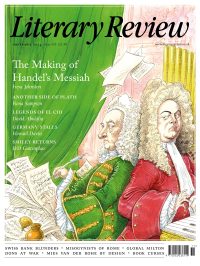Eleanor Baker
Death to Book Thieves!
At the top of two folios in a 15th-century manuscript, two rhyming lines of Middle English are written in dark red ink:
Yll mowth he spede: where that he go,
That leuyth this boke: to frende or to foo.
Amen.
May he fare ill, wherever he goes,
That leaves this book to friend or to foe.
Amen.
These words were inscribed by William Wymondham, an Augustinian canon at the Priory of Kirby Bellars, which sits just outside Melton Mowbray in Leicestershire. Wymondham clearly treasured this book, of which he was both the scribe and the owner. On a folio near the beginning of the manuscript, he writes in large-lettered Latin that he would rather lose all his other possessions than this one book.
The texts contained within the manuscript, which is now held at the Wren Library at Trinity College, Cambridge, may seem unexpected reading matter for a man of religion in the 15th century. Its contents include texts on esoteric philosophy and chiromancy (palm reading), historical and medical notes, poems and,

Sign Up to our newsletter
Receive free articles, highlights from the archive, news, details of prizes, and much more.@Lit_Review
Follow Literary Review on Twitter
Twitter Feed
It wasn’t until 1825 that Pepys’s diary became available for the first time. How it was eventually decrypted and published is a story of subterfuge and duplicity.
Kate Loveman tells the tale.
Kate Loveman - Publishing Pepys
Kate Loveman: Publishing Pepys
literaryreview.co.uk
Arthur Christopher Benson was a pillar of the Edwardian establishment. He was supremely well connected. As his newly published diaries reveal, he was also riotously indiscreet.
Piers Brendon compares Benson’s journals to others from the 20th century.
Piers Brendon - Land of Dopes & Tories
Piers Brendon: Land of Dopes & Tories - The Benson Diaries: Selections from the Diary of Arthur Christopher Benson by Eamon Duffy & Ronald Hyam (edd)
literaryreview.co.uk
Of the siblings Gwen and Augustus John, it is Augustus who has commanded most attention from collectors and connoisseurs.
Was he really the finer artist, asks Tanya Harrod, or is it time Gwen emerged from her brother’s shadow?
Tanya Harrod - Cut from the Same Canvas
Tanya Harrod: Cut from the Same Canvas - Artists, Siblings, Visionaries: The Lives and Loves of Gwen and Augustus John by Judith Mackrell
literaryreview.co.uk